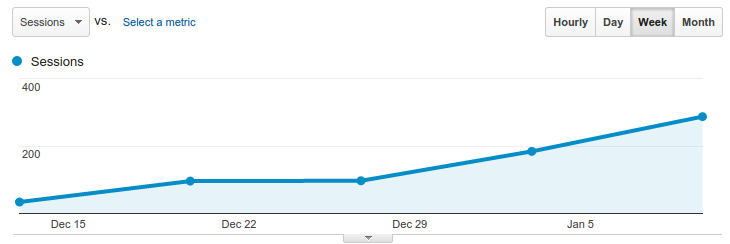Does SEO (search engine optimisation) work?
Published on Thursday, March 10th 2016 by Aaron Whiffin
SEO (search engine optimisation) is the art of subtly adjusting a website so that search engines favour it when deciding which websites rank highest in their results.
There are a lot of SEO-cowboys in the industry, those who promise the world, misadvise clients on what they should be doing, or use ‘illegal’ SEO techniques that can do more harm than good.
But if it’s done properly, does SEO actually work?
The short answer is “yes”, and I’ll open this article with a graph of one of our client’s traffic from when we took over an SEO project to a month afterwards.

So it does work; no doubt about it.
But, and there’s always a ‘but’, for some keywords the costs may outweigh the return. It all depends on your industry, your competitors, they keywords you are aiming for, and your underlying website.
We had someone approach us the other day asking us to get them number one in Google for “Disney holidays”… Their website had one relevant page (i.e. about Disney) and to get to the first position in Google we’d have to beat 39,400,000 other web pages including Walt Disney, Disneyland Paris, Thomas Cook and Virgin Holidays.
Put yourself in Google’s shoes, if someone types “Disney holidays” in to Google they would probably want to see the Walt Disney World or the Disneyland Paris websites, with hundreds of relevant pages. They probably wouldn’t want to be redirected to a single page on one of our clients’ websites. So why would Google send them there? Short answer, they wouldn’t.
We told this particular (potential) client that they need to consider a different marketing strategy.
SEOs (that’s people like us) need to be realistic, and only experience can let us know what is achievable and what isn’t, there’s no magic formula that works for everyone.
We also need to be very careful in what we do, as there’s a sliding scale ranging from search engine friendly (white-hat) SEO techniques, to ‘illegal’ (black-hat) ones. If we get this wrong, a client’s website could literally drop off of Google overnight. This hasn’t happened to websites following any of our changes (we’re the good guys), but we’ve taken over several projects from some SEO-cowboys and had to rectify their mistakes.
There are no quick-wins, no short cuts; it all boils down to using an SEO to research the industry and competition, carefully choose appropriate keywords (sometimes concentrating on specific niches), and create a strategy with realistic expectations.
This strategy will usually involve:
- Structuring the website so that it has at least one page for each desired keyword/phrase.
- Creating quality relevant unique content for the website
- Benchmarking any changes so that it can be reviewed and adjusted in the future.
The two most important points are “quality relevant unique content” this is absolutely paramount for search engines; and “reviewed and adjusted” as search engines, and your competitors, always evolve.
So yes, SEO certainly does work, so long as you have realistic expectations.
And of course, SEO isn’t for everyone, if you’re in a highly competitive sector, or if your keywords are too broad, there may be far more cost effective solutions such as PPC (pay per click) where you effectively pay to get yourself on the first page of Google or to show your advert to certain people on Facebook.
If need help with anything mentioned in this article and want honest, and crucially realistic advice from an SEO expert then please get in touch.
We are Webbed Feet UK, we can get people to visit your website.

